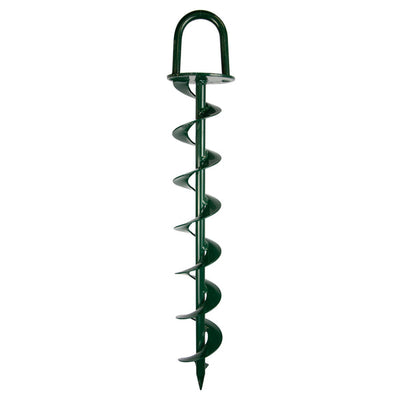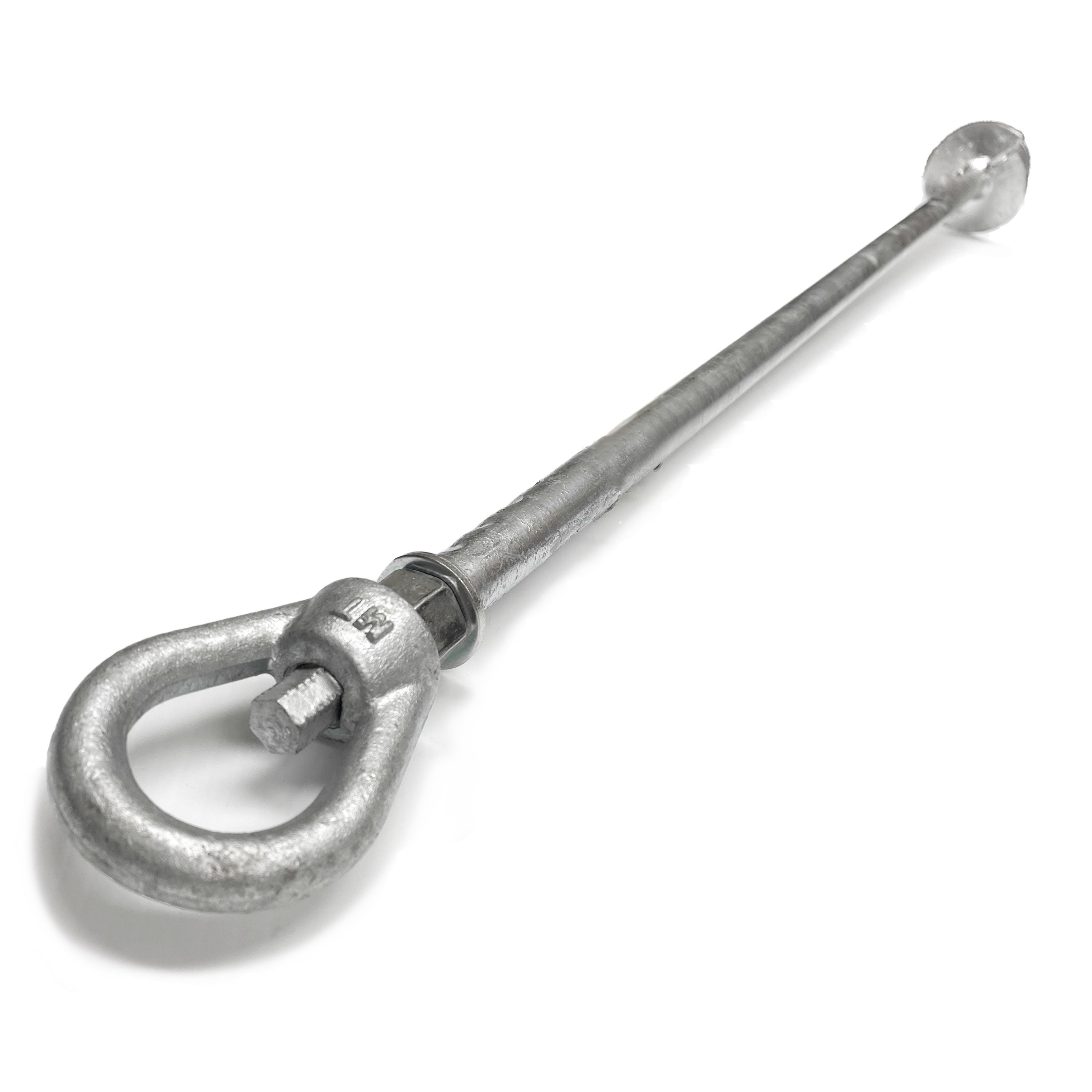Important Characteristics to Consider When Shopping for a Strong Ground Anchor
Explore the Different Types of Ground Support for Your Following Task
When embarking on a building and construction or landscaping job, understanding the numerous kinds of ground anchors readily available is essential to making certain both security and toughness (Ground Anchor). From auger supports, which master diverse dirt conditions, to risk supports created for short-term installations, the choices are many. In addition, concrete and screw supports present distinct benefits in particular circumstances, while deadman supports are tailored for applications requiring resistance to side pressures. The option of a suitable support type can significantly affect the total success of your job, triggering additional exploration right into their respective advantages and applications.

Auger Anchors
Auger anchors are a popular option in numerous construction and landscaping jobs as a result of their distinct layout and effective securing abilities. These anchors are composed of a helical screw-like shaft that is driven right into the ground, permitting a steady and protected hold. The spiral design assists in simple setup and makes the most of resistance against side pressures, making auger anchors especially efficient in applications such as fence, short-lived frameworks, and erosion control.
The setup procedure of auger supports is relatively simple. They can be manually or mechanically set up, depending upon the dimension and called for deepness. This versatility allows for their use in varied soil conditions, from sandy to clayey terrains. Auger anchors can be easily eliminated and recycled, which adds to their cost-effectiveness and sustainability.
Among the considerable benefits of auger anchors is their capacity to distribute lots evenly across the bordering soil, minimizing the danger of dirt disturbance and lessening ecological effect. Furthermore, they are less vulnerable to heaving or loosening up with time compared to standard securing methods. Auger supports are a superb selection for tasks calling for sturdy and trustworthy anchoring solutions.

Risk Anchors
When it comes to securing structures in a selection of exterior applications, risk anchors offer a straightforward and trusted remedy. These supports are generally constructed from sturdy materials such as steel or light weight aluminum, designed to endure ecological stress and anxieties while supplying ideal security. Their simple style enables quick installation, making them a perfect selection for long-term or short-term anchoring demands.
Stake supports are particularly beneficial in protecting outdoors tents, covers, and various other lightweight structures against wind and weather condition. They function by being driven right into the ground at an angle, producing a strong hold that resists pull-out pressures - Ground Anchor. The performance of stake supports depends on a number of elements, including soil kind, moisture web content, and the angle of setup
For included safety and security, several risk anchors come with add-on points for bands or ropes, permitting for tension changes as essential. In applications such as landscaping or building, they can effectively support equipment or structures on irregular terrain. In general, risk supports provide a flexible and affordable remedy for securing different outdoor installations, making them a favored option for specialists and do it yourself lovers alike.
Concrete Anchors
Concrete supports offer a robust service for protecting structures to concrete surface areas, making certain stability and safety and security in various applications. These supports are crucial for jobs ranging from household constructions to massive commercial installations. They come in various kinds, including growth supports, glue anchors, and undercut supports, each designed for details tons demands and ecological conditions.
Growth supports rely upon mechanical systems to grasp the concrete when mounted. They are perfect for tool to durable applications. Adhesive anchors make use of high-strength epoxy or material to bond the anchor to the concrete, using remarkable load-bearing capacities, specifically in fractured concrete scenarios. Undercut supports create a special shape within the concrete, providing outstanding holding power, particularly in applications where tensile lots are prevalent.
When executed appropriately, concrete anchors considerably enhance the architectural stability of different jobs, making them indispensable in modern construction practices. Comprehending the details requirements of your job will aid in choosing the appropriate type of concrete support for the job.
Screw Anchors

Screw supports are a functional attaching service that can be efficiently employed in a variety of applications where typical concrete supports may not be enough. These anchors include a helical layout that enables them to be easily driven into the ground, making them suitable for use in soil and various other substratums. Their distinct framework gives outstanding holding power and resistance to pull-out pressures, making them ideal for countless jobs, from landscaping to structural assistance.
One of the key benefits of screw anchors is their convenience of installment. They call for minimal tools and can often be set up without the demand for excavation, which saves both time and labor prices. Additionally, screw supports can be gotten rid of and recycled, supplying a lasting service for short-lived applications.
Screw supports are specifically valuable in locations where soil conditions are challenging, such as sandy or loosened soils. Their ability to be installed at differing midsts permits customization based upon details project demands. On the whole, screw supports give a reliable and trustworthy securing approach, making them a superb option for designers and contractors seeking reliable solutions for their projects.
Deadman Anchors
Deadman anchors function as a durable solution for supporting structures in challenging problems, particularly where site link traditional securing techniques may fall brief. These supports consist of large, hefty items buried underground, which develop resistance against side pressures. The style usually includes a straight element, such as a block of concrete or a steel plate, hidden in the soil, to which bands or cables are attached.
The performance of deadman anchors depends on their capability to disperse tons over a bigger location, reducing the danger of failing in unsteady soil conditions. They are specifically beneficial in applications such as maintaining wall surfaces, momentary frameworks, and slope stablizing, where soil motion can endanger the honesty of the framework.
Installation of deadman anchors needs careful preparation to guarantee they are placed at the right deepness and positioning, optimizing their load-bearing ability. While they may need more labor and material than lightweight supports, their reliability in unfavorable conditions makes them invaluable for long-lasting jobs. Furthermore, deadman anchors are versatile and can be adapted to different applications, making them a best option for designers dealing with unique difficulties in their tasks.
Conclusion
Auger anchors succeed in diverse dirt conditions, while stake supports suit short-lived applications. For concrete surface areas, expansion and sticky supports give reliable choices, and screw anchors supply flexibility in difficult terrains.
In addition, concrete and screw anchors present special benefits in specific scenarios, while deadman anchors are tailored for applications calling for resistance to lateral pressures - Ground Anchor.Auger supports are a popular choice in various building and construction and landscaping projects due to click over here their special style and reliable securing capabilities. They come in various types, including growth anchors, glue anchors, and undercut anchors, each made for specific lots needs and ecological problems
Adhesive supports use high-strength epoxy or resin to bond the his response anchor to the concrete, providing premium load-bearing capacities, especially in cracked concrete circumstances. On the whole, screw supports offer a trustworthy and effective securing technique, making them an outstanding choice for engineers and contractors looking for efficient solutions for their tasks.